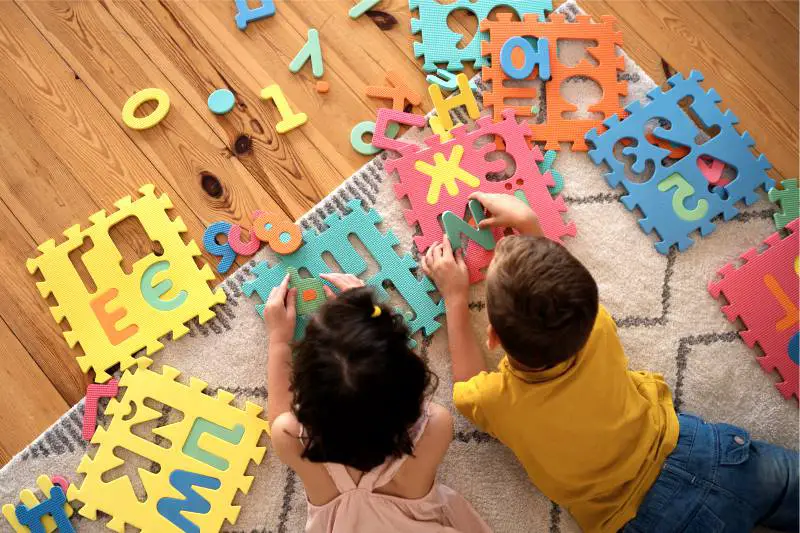Preschool education plays a crucial role in preparing children from English medium schools near Garia for the next educational phase – kindergarten. It serves as an important stepping stone in their learning journey, equipping them with the necessary skills and knowledge to thrive in a structured classroom environment.
Preschool Kolkata provides a structured setting where children learn to follow routines and instructions. This helps them develop essential self-regulation skills, such as the ability to listen, follow directions, and manage their time effectively. These skills are fundamental for success in kindergarten, where children are expected to participate in group activities, complete tasks independently, and adhere to a daily schedule.
Preschool fosters social and emotional development, which is crucial for kindergarten readiness. In a preschool setting, children have the opportunity to interact with their peers, develop friendships, and learn how to cooperate and resolve conflicts. These experiences help them cultivate important social skills, such as sharing, taking turns, and empathizing with others. By engaging in various group activities, such as circle time, collaborative projects, and free play, children develop the necessary social competencies to succeed in a kindergarten classroom.
Another key aspect of preschool education in schools in south Kolkata is the development of early literacy and numeracy skills. Preschool provides a rich environment where children are exposed to language and literacy activities, such as reading books, engaging in storytelling, and practising phonics. These experiences lay the foundation for reading comprehension, vocabulary development, and early writing skills. Similarly, through hands-on activities, games, and manipulatives, children are introduced to basic mathematical concepts, such as counting, sorting, and recognizing patterns. This early exposure and practice of literacy and numeracy skills give children a head start in their academic journey and help them feel more confident and competent in the kindergarten classroom.
Preschool promotes cognitive development by providing a range of stimulating experiences and opportunities for exploration. Through age-appropriate activities and materials, children are encouraged to think critically, solve problems, and engage in creative play. These experiences enhance their cognitive abilities, such as memory, attention, and problem-solving skills. When children enter kindergarten, they are better equipped to handle complex tasks and adapt to new learning challenges.
Preschool also supports physical development. Children from top English medium schools near Garia engage in various gross motor activities, such as running, jumping, and climbing, which help develop their coordination, balance, and strength. Fine motor skills, crucial for tasks like writing and drawing, are also honed through activities such as cutting, threading, and manipulating small objects. By promoting physical development, preschool ensures that children from top schools in south Kolkata are physically ready to participate in the more structured and demanding activities of the kindergarten classroom.
By providing a structured setting, fostering social and emotional development, promoting early literacy and numeracy skills, enhancing cognitive abilities, and supporting physical development, preschool Kolkata equips children with the necessary tools to thrive in kindergarten and beyond. It sets the stage for a successful educational journey and lays the foundation for lifelong learning.
Is Your Child Ready for Kindergarten?
Kindergarten is an important milestone in a child's educational journey. It serves as a foundation for their future academic and social development. As a parent, it is natural to wonder if your child is ready to take this step.
Physical Readiness
Physical readiness encompasses a child's ability to handle the demands of a kindergarten environment. It includes fine and gross motor skills, coordination, and overall health. Some signs of physical readiness include:
- Motor Skills: Can your child hold a pencil or crayon properly? Can they use scissors to cut simple shapes? These skills indicate their ability to participate in various classroom activities.
- Stamina: Is your child able to sit still and focus for short periods of time? Kindergarteners are expected to participate in circle time, listen to instructions, and complete tasks independently.
- Independence: Can your child manage personal tasks, such as using the restroom, dressing themselves, and washing their hands? Kindergarten teachers encourage children to be self-sufficient in these areas.
Cognitive Readiness
Cognitive readiness refers to a child's mental abilities and cognitive skills. This includes their language development, problem-solving skills, and ability to follow instructions. Signs of cognitive readiness include:
- Language Skills: Can your child communicate effectively and express their needs and ideas? Kindergarteners are exposed to new vocabulary and are expected to follow instructions and engage in group discussions.
- Literacy Skills: Does your child show an interest in books and reading? Can they recognize letters and some sight words? These pre-reading skills lay a strong foundation for future academic success.
- Problem-Solving: Can your child solve simple puzzles or complete age-appropriate tasks independently? Kindergarteners are encouraged to think critically, solve problems, and make decisions.
Social and Emotional Readiness
Social and emotional readiness involves a child's ability to interact with others, manage their emotions, and adapt to new situations. Signs of social and emotional readiness include:
- Social Skills: Does your child show an interest in making friends and engaging in cooperative play? Kindergarteners spend a significant amount of time interacting with peers, so having basic social skills is important.
- Emotional Regulation: Can your child manage their emotions appropriately? Kindergarten can sometimes be overwhelming, so children need to have some level of emotional resilience and self-regulation.
- Independence: Is your child able to follow routines and transitions? Kindergarten requires children to adapt to new schedules and routines, so having a degree of independence is beneficial.
Determining whether your child is ready for kindergarten involves assessing their physical, cognitive, and social-emotional readiness. While every child develops at their own pace, observing these key indicators can help you make an informed decision. Remember, kindergarten is not just about academics but also about socialization and emotional growth. By considering these factors, you can ensure that your child has a successful and fulfilling kindergarten experience.







